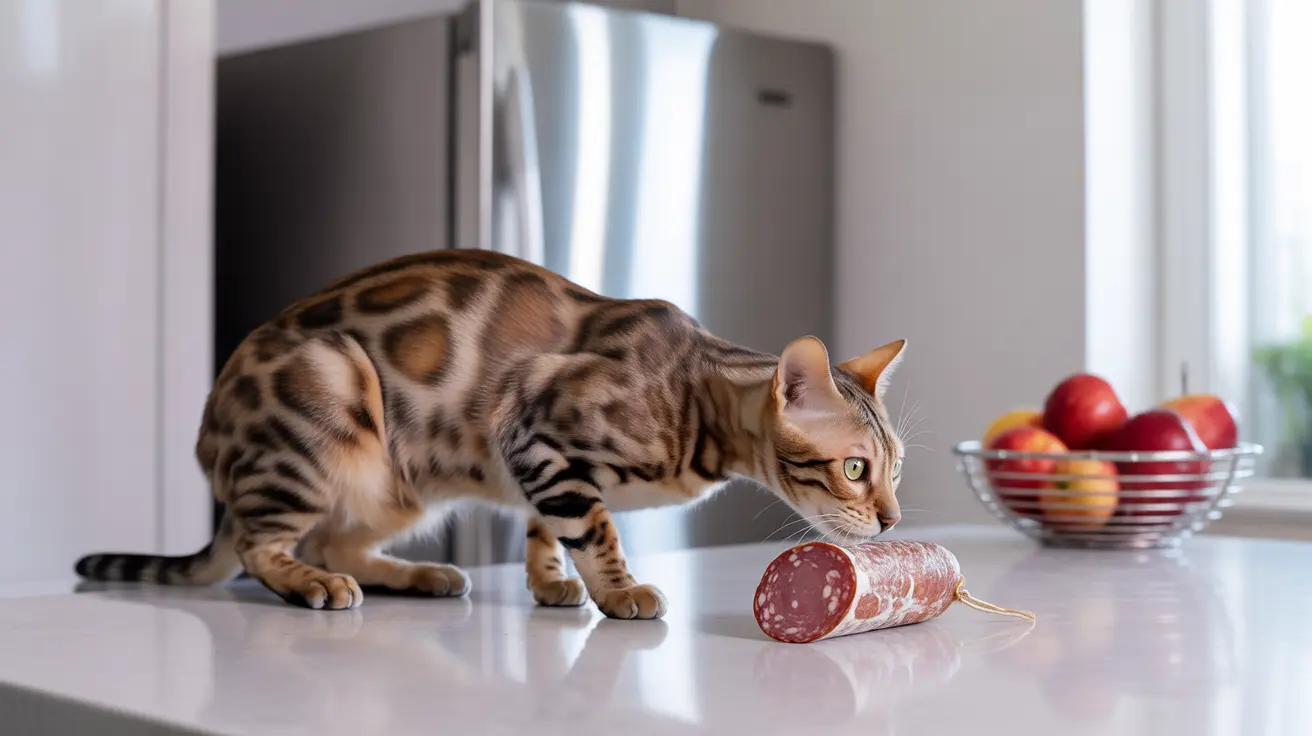If you've ever wondered whether it's safe to share salami with your feline friend, you're not alone. While cats are naturally drawn to the rich, meaty aroma of salami, this processed meat product can pose several health risks to our feline companions.
In this comprehensive guide, we'll explore why cats find salami so appealing, the potential dangers it presents, and what you need to know to keep your pet safe. We'll also discuss healthier alternatives that can satisfy your cat's carnivorous cravings.
Understanding Why Cats Are Attracted to Salami
Cats are obligate carnivores with a strong attraction to meat proteins and fats. Salami's intense aroma and high meat content naturally appeal to their hunting instincts. However, what appeals to cats isn't always safe for them to eat.
The Hidden Dangers of Salami for Cats
Excessive Sodium Content
One of the biggest concerns with salami is its extremely high sodium content. A single slice contains nearly five times the recommended daily sodium intake for cats. This excessive salt can lead to:
- Severe dehydration
- High blood pressure
- Kidney stress
- Sodium ion poisoning
Harmful Additives and Seasonings
Most salamis contain ingredients that are toxic to cats, including:
- Garlic and onion powder
- Various spices
- Preservatives
- Chemical additives
Fat Content and Caloric Density
Salami's high fat content can contribute to:
- Obesity
- Pancreatitis
- Digestive issues
- Long-term health complications
What Happens If Your Cat Eats Salami?
While a tiny piece of plain salami might not cause immediate harm, regular consumption or larger portions can lead to serious health issues. Watch for these warning signs:
- Excessive thirst
- Vomiting or diarrhea
- Lethargy
- Loss of appetite
- Unusual behavior
Safe Alternatives to Salami for Cats
Instead of salami, consider these healthy options:
- Plain, cooked chicken or turkey
- Commercial cat treats
- Small pieces of lean, unseasoned meat
- Specially formulated feline treats
Prevention and Best Practices
To protect your cat from the dangers of salami:
- Keep all processed meats securely stored
- Educate family members about safe cat foods
- Maintain a consistent, veterinarian-approved diet
- Choose appropriate cat treats instead of human food
Frequently Asked Questions
Can cats safely eat salami, and what are the health risks of feeding it to them?
No, cats should not regularly eat salami. The high sodium content, harmful additives, and fat content make it unsafe for feline consumption. Risks include dehydration, sodium poisoning, and digestive problems.
What symptoms should I watch for if my cat eats salami containing garlic or onion?
Watch for signs of garlic/onion toxicity including lethargy, pale gums, weakness, rapid breathing, and vomiting. These ingredients can cause dangerous hemolytic anemia in cats.
How much salami is too much salt for a cat, and can it cause kidney problems?
Even a small slice of salami contains too much salt for cats. Regular exposure to high sodium can lead to kidney stress, hypertension, and other serious health issues. Cats need only about 40mg of sodium daily.
What should I do if my cat accidentally consumes a large amount of salami?
Contact your veterinarian immediately. Provide fresh water and monitor for symptoms like excessive thirst, vomiting, diarrhea, or unusual behavior. Quick intervention can prevent serious complications.
What are healthier meat treat alternatives to salami for cats?
Choose plain, cooked chicken or turkey, commercial cat treats, or veterinarian-approved protein snacks. These alternatives provide the meaty flavor cats love without the risks associated with processed meats.
Conclusion
While cats might be attracted to salami, it's best to avoid feeding it to them entirely. The risks far outweigh any potential benefits, and there are many safer alternatives available. Keep your feline friend healthy by sticking to appropriate cat food and treats designed specifically for their nutritional needs.






